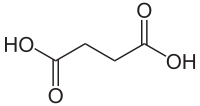
Photo from wikipedia
BACKGROUND Our earlier studies showed that inhibiting prolyl-4-hydroxylase enzymes (PHD-1 and PHD-3) improves angiogenesis, heart function, and limb perfusion in mouse models via stabilizing hypoxia-inducible transcription factor-alpha (HIF-1α). The present… Click to show full abstract
BACKGROUND Our earlier studies showed that inhibiting prolyl-4-hydroxylase enzymes (PHD-1 and PHD-3) improves angiogenesis, heart function, and limb perfusion in mouse models via stabilizing hypoxia-inducible transcription factor-alpha (HIF-1α). The present study explored the effects of the prolyl-4-hydroxylase enzyme, PHD-2, on ischemic heart failure using cardiac-specific PHD-2 gene knockout (KO) mice (PHD2-/-). STUDY DESIGN Adult wild-type (WT) and PHD2-/- mice, 8-12 weeks old, were subjected to myocardial infarction (MI) by irreversibly ligating the left anterior descending (LAD) coronary artery. All sham group mice underwent surgery without LAD ligation. Animals were divided into four groups 1) Wild-type Sham (WTS); Wild-Type myocardial infarction (WTMI); 3) PHD2KO Sham (PHD2-/-S); 4) PHD2KO myocardial infarction (PHD2-/-MI). Left ventricular tissue samples collected at various time points following surgery were used for microRNA expression profiling, Western blotting, immunohistochemical, and echocardiographic analysis. RESULTS Volcano plot analysis revealed 19 differentially expressed miRNAs in the PHD2-/-MI compared to the WTMI group. Target analysis using Ingenuity Pathway Analysis showed several differentially regulated miRNAs targeting key signaling pathways such as Akt, VEGF, Ang-1, PTEN, apoptosis, and hypoxia pathways. Compared to the WTMI group, Western blot analysis showed increased HIF-1α, VEGF, phospho-AKT, and β-catenin expression and reduced Bax expression for the PHD2-/-MI group post-MI. Echocardiographic analysis showed preserved heart functions, and picrosirius red staining revealed decreased fibrosis in PHD2-/-MI compared to the WTMI group. CONCLUSION PHD2 inhibition showed preserved heart function, enhanced angiogenic factor expression, and decreased apoptotic markers after MI. Overall, PHD2 gene inhibition is a promising candidate for managing cardiovascular diseases.
Journal Title: Journal of the American College of Surgeons
Year Published: 2022
Link to full text (if available)
Share on Social Media: Sign Up to like & get
recommendations!